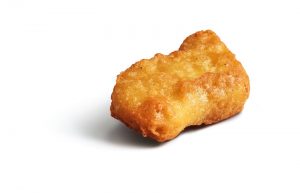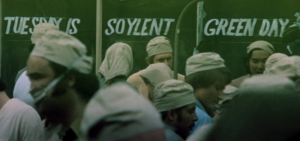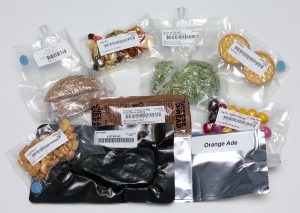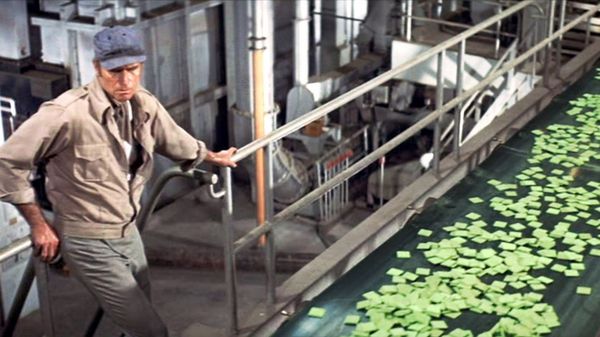Caldwell, ID. Finland’s Solar Foods has recently debuted Solein, a protein powder made using carbon dioxide, water, and electricity. Solar Foods’ website proudly proclaims that it makes “food out of thin air” through a “fully natural fermentation process . . . similar to the production of yeast.” Consumers can soon expect an “entirely new kind of food” that is both “natural” and “free from the burdens of agriculture and aquaculture.”
What about taste? Again, from the website: “Neutral in taste and appearance, Solein vanishes into your daily meal, while simultaneously maintaining its rich nutritional value. By offering a unified solution that caters to virtually every imaginable meal of today, Solein creates a dazzling world of opportunities for entirely new foods of tomorrow.” Sound too good to be true? Solar Foods is not shy: “If ‘science is real magic,’ then it’s time to meet the magic powder of science.”
Solar Foods has been championed most prominently by British environmentalist George Monbiot, who is a true believer. “Before long,” Monbiot writes, “most of our food will come neither from animals nor plants, but from unicellular life.” Monbiot sees “some drawbacks”—especially the loss of “millions” of jobs and a further concentration of food production monopolies—but ultimately believes that Solein has come “in the nick of time,” especially if such potential hazards can be addressed. Because the land required to “ferm” Solein is so minimal, Solar Foods estimates that the land efficiency is 20,000 times greater than in conventional farming. For this and other reasons, Monbiot argues that Solein may be enough to combat everything from climate change to species extinction.
In sum: if Solar Foods is as successful as they plan to become and as Monbiot hopes they will prove to be, it is not just the remaining human-scale farmers whose livelihoods will be threatened—Solar Foods is the end of agriculture as we know it. Even (or especially, perhaps) the farms that “got big” along the Earl Butz model will be out of business and replaced by Solar Green ferming vats.
Aside from the fact that yet another company is now marketing alternative foods with a name that invokes Soylent Green, our panel for this month’s Brass Spittoon thinks there are good reasons to question the “inevitabilities” presented here.
Gracy Olmstead’s writing has appeared in The New York Times, The Washington Post, The Weekly Standard, and elsewhere. Her forthcoming book will focus on the Idaho farming community where she grew up, and will consider what we owe to the past and to place. Garth Brown raises cows, pigs, and sheep on Cairncrest Farm in central New York. Jason Peters lives in Ingham County, Michigan, where he eats eggs from his own chickens, potatoes from his own garden, and apples from his own apple trees.
Stewart: First, do you think Solein is actually as promising as its supporters claim?
Olmstead: Most Americans have embraced consumption without bounds, consumption without connection. The root problems with our culture and the food economy it cultivates are this disconnection and limitlessness: the former cultivates ignorance and apathy toward the earth and its health, whereas the latter depletes and degrades over time. Modern industrial agriculture, insofar as it feeds and serves this disconnection and limitlessness, is also fundamentally flawed.
But most “cures” for our current agricultural predicament, including Solein, still buy into the logic of this culture: they are vehemently opposed to imposing limits of any kind. The experts and scientists in labs are currently attempting to engineer our way into infinite choice, limitless consumption without consequences. But this does nothing to truly fix the problems we have created for ourselves—because we still need to heal what we have broken, to reconnect what has become disconnected. We still need to embrace (perhaps even celebrate) limits. And that does not involve abandoning the earth—rather, it necessitates that we ought to restore our bonds with it.
Brown: Like flying cars or a simplified tax code, the promise of a perfect, scientifically produced food has always been about two years in the future—it can be so fully imagined that it seems like it should be a reality soon, but for some reason soon never quite arrives. The fact that Quorn and Soylent haven’t become more than niche products (mostly because they taste like cardboard) does nothing to diminish the hype around the next generation of food replacers. Solein is just the latest substance to promise nutritional and environmental salvation in a tidy, market-friendly package. While there’s no reason to think it will be the product that finally goes mainstream, it represents an idea that has accrued a critical mass of money and media. If not Solein, something similar will likely be a big part of the future food system.
From a production standpoint, using unicellular organisms to produce food has advantages. Specifically, they can theoretically be far more metabolically efficient than something like a cow, which will be incorrigibly determined to waste energy on grazing, caring for young, socializing, and enjoying life in her uniquely bovine fashion. A cow must have the margin to deal with all the vagaries of weather, forage quality, and the general peculiarities of her particular place, while Solein could be created in a completely controlled environment, with wholly known input and output.
Of course Solein is not as promising as its proponents claim. It is a product made by a company looking for attention and money. But the premise behind it is sound, and it is likely that something like it will eventually be able to produce calories quite efficiently.
Peters: No. They’re technodupes, like the people who think that our energy wants—which we call “energy needs”—are going to be met by wind and solar.
Stewart: Front Porch Republic has often published writers who criticize modern agricultural practices. Monbiot goes further and criticizes all agriculture. Is there any middle ground here?
Olmstead: In our own lifetimes, we are seeing the destructive results of industrialized agriculture as it is currently implemented. Our land is suffering from malnutrition and depletion. Our water and climate, plant and animal life all bear the marks of degradation and decay. But we must consider not just what agriculture currently is, but what it ought to be.
Agriculture is an ancient craft that ties both body and mind to the earth and its cultivation. It is the fundamental craft, insofar as it serves to feed and clothe human beings. And it is one which, at least historically speaking, fosters a reverential care for plant, animal, water, and soil. The seasons of planting and harvesting and preserving, feasting and thanksgiving, were inextricably tied to farming. And they each cultivated a different culture than the one we have now, because of their connected nature. As Wendell Berry has put it, “Everything in the Creation is related to everything else and dependent on everything else. The Creation is one; it is a uni-verse, a whole, the parts of which are all ‘turned into one.’”
This is a philosophy of the earth which is undergirded and supported by agriculture, at least in its more traditional and ancient aspects. It is an understanding of the earth that humanity is likely to dispense with if “freed from the burdens of agriculture and aquaculture.”
Brown: There’s a strain of nostalgia often found in those of us who criticize the industrial food system. While looking to the past is understandable, relying on it as a template is misguided. Large scale agriculture has rarely been practiced in a way that does not diminish the soil over time. There is scant evidence that us farmers can be responsible stewards of the land if a generational view is taken, so Monbiot’s assessment has an uncomfortable degree of validity to it.
Put another way, betting that we can shift agricultural practices to such an extent that they exist harmoniously with the ecosystems and communities in which they are situated is perhaps even more of an exercise in wishful thinking (if a less dystopian one) than imagining giant vats of solar-powered transgenic bacteria feeding the teeming masses.
Peters: No. There’s good farming, which we need; there’s bad farming, which will eventually make good farming impossible; and then there are technodupes, whom we should fear or ignore—whichever works.
Stewart: If factory farms are already destructive of much of what makes agrarian culture praiseworthy, would a Solein farm be a better alternative? In other words, would a Solein McNugget be any worse than a Chicken McNugget? Can you imagine a scenario where there are about the same number of small farms as there are now, except that they exist as boutique options alongside Solein vats rather than alongside factory farms?
Olmstead: To some extent, this new form of “Soylent” could serve some purpose. Insofar as our supermarkets are dominated by “Big Sugar” and “King Corn,” as well as other big agribusinesses, it could be salutary to replace some of the worst forms of food production with something far “cleaner,” both for the environment and for our bodies. If Solein replaced some of the chocolate bars and protein powders that fill our grocery store shelves, it might serve some good purposes in that vein. But I don’t think it can or should replace agriculture—even large-scale agriculture—entirely. We actually need a reinvigoration of the “agriculture of the middle,” which is most weakened right now by the consolidating forces of the market. These farms will be as important as the small-scale ones.
Peters: Can I imagine such a scenario? In the sense that I can imagine the inner circle of hell, yes. A Solein McNugget will just be a worse version of something that’s already bad. A “McNugget” disrespects both the chicken and the language. People who want to replace food with non-food belong in that inner circle with the maniacs who would replace lovers with sexbots.
A “McNugget” disrespects both the chicken and the language. People who want to replace food with non-food belong in that inner circle with the maniacs who would replace lovers with sexbots.
Stewart: At least in the way that Monbiot frames it, Solar Foods is poised to make a decision about the future of food for several generations or more. Should it be opposed solely on those grounds?
Brown: The methods by which something like Solein would be produced vary little from the methods used by the current industrial agricultural system. Breeding chickens to grow from hatch to market weight in six weeks, crowding tens of thousands of such chickens into a barn, feeding them a perfectly calibrated ration, and then mass harvesting them for lean protein, already apes the factory in its relentless pursuit of speed, efficiency, and certainty. In many ways it’s closer to the sort of food production envisioned by the makers of Solein than it is to actual farming.
But the real distinction between the raising of living, sentient organisms, however attenuated their existence, and vats of engineered bacteria cannot be denied. My mind certainly recoils at the idea that the food system should discard domestication in favor of total dominion, no matter how strongly the utilitarian calculus suggests that path.
Unfortunately, visceral revulsion is not a sufficient objection, and it can be a source of willful ignorance. The way the debate surrounding GMOs revolves on the question of their impact on human health is a prime example of this dynamic. Even though the science suggesting they are worse than their conventional equivalent is inconclusive at best, opposition is nevertheless framed almost entirely on the premise that eating something made from modified corn is akin to smoking a pack of cigarettes in an asbestos factory.
The anxiety about products like Solein (and GMOs, for that matter) has more to do with meaning than health. But in a thoroughly cosmopolitan public discourse there isn’t much appetite for arguments that stray from an analysis of the universal, by which I mean the narrowest goods—promoting individual freedoms—and the broadest—ensuring that the planet doesn’t become a stinking, overheated ball of dirt. The way people known to one another and bound by the happenstance of a shared place should best live together is implicitly relegated to a secondary position in the rare cases that it is considered at all.
And the utilitarian arguments, however incomplete, are persuasive. Solein likely would provide huge environmental benefits compared to conventional agriculture, and it would alleviate a staggering amount of suffering. Living pigs and chickens are ill suited to industrialized production methods, so if industrial production methods are going to be the main way food is produced, better to leave sentient creatures out of the process, and living soil too, for that matter. It could hardly do worse by them.
Peters: Yes. Adam and Eve decided for everyone. The lunatics who went into the nucleus decided for everyone. There should be no more deciding for everyone.
Stewart: What could go wrong?
Olmstead: Solein represents another endeavor on the part of humankind to separate our bodies from the earth—to deny the fact that “from dust we are, and to dust we shall return.” It is therefore an insufficient response to the problems of cultivating the earth, because it negates our responsibility to proper responsibility in that sphere of work. Removing ourselves from the chain of proper stewardship and eating—especially at a time in which less and less humans work outside, and more and more work in cubicles—suggests that our interactions with earth and geography will become increasingly consumptive and disconnected. If we do not partake of the fruit of the earth, what thanks do we offer? What do we give back? What do we owe?
Nothing, perhaps. A few hikes in the woods will never connect us to the earth like the onions and carrots grown in our backyards. Solein’s fermented properties may prevent it from depleting our gut health, but do we lose something vital when we no longer get our microbial health from the soil, from the living earth?
Our relationship with the earth was never meant to be transactional. It was meant to be full of thanksgiving and joy. We have lost that. But Solein will not fix this broken relationship. Only a renewed vision for the earth and its fruit will do that.
Brown: My bet is that the long-term health effects of eating Solein would be negligible. They certainly wouldn’t be worse than the results of a standard American diet. Solein going wrong would not be a plague and it would not be a famine. It would go wrong in the same inexorable way agriculture has been going wrong for at least the last fifty years. That is, it would provide calories without providing any meaningful connection. The consolidation and industrialization of agriculture has achieved its aims of producing ever more food of sufficient quality to keep people alive. This has come with a steep price, but one that is by its nature difficult to calculate; how do you weigh an increase in bushels per acre against the loss of community such an increase requires?
Focusing opposition on discrete technologies like Solein cannot succeed if the aim is to cultivate an agriculture that promotes human flourishing. Solein is a fast, flashy, global response to a global problem, one that presumes a monolithic food system to be inevitable. Quibbling over the costs and benefits of it compared to lab grown meat compared to industrial feedlots misses the point.
The best response, I think, is to build something better, something completely outside of the current paradigm. What this looks like will necessarily vary from one place to another, and so it cannot offer itself up as any sort of universal solution. Farming should be everything that Solein is not—local, community based, integrated, attentive to beauty, joy, and meaning.
Put in such blatantly optimistic terms, this strikes me as fanciful, especially the idea that it could ever be more than a niche. So perhaps the best future that I should realistically hope for is one in which technologies like Solein have blunted the worst depredations of industrial food production while leaving a few places free for alternative models like the one I imagine. Or maybe there are several million other people with similar goals, and together we will reshape the landscape in several million small, interconnected ways, and thus effect a global change. Either way, Solein and its ilk should be viewed as the logical endpoint of a larger system, and opposition should consist not of fretting about a singular product, but instead should be a committed, dreamy, most likely quixotic attempt to create something particular and human.
Peters: This, alas, is a question that the technodupes and technocrats don’t ask.
I learn from only a little digging that “when we get to Mars, we’re going to need to eat something. It sounds like this [Solein] could be a very promising technology for farming on Mars.”
Additionally, I learn of a sure confidence according to which “we’ll need 70 percent more food by the end of the century.”
And I learn that the good folks by whose beneficence we will be able to eat in perpetuity have “set out to disconnect food from agriculture.”
 I have a differing and, as it happens, correct opinion: we’re not going to Mars—ever—and no earthling is ever going to live there or (therefore) need to eat there; also, there is no way to know that we’ll need 70 percent more food at any time in the future, which is an unknown country from whose bourn no traveler returns; and I decidedly do not want to disconnect food from agriculture. For one thing, it can’t be done. For another, anything claiming to be food that doesn’t present itself in accordance with Nature’s ways and means isn’t food.
I have a differing and, as it happens, correct opinion: we’re not going to Mars—ever—and no earthling is ever going to live there or (therefore) need to eat there; also, there is no way to know that we’ll need 70 percent more food at any time in the future, which is an unknown country from whose bourn no traveler returns; and I decidedly do not want to disconnect food from agriculture. For one thing, it can’t be done. For another, anything claiming to be food that doesn’t present itself in accordance with Nature’s ways and means isn’t food.
Here’s a question for you: how can you tell if a man has lost it? I mean truly lost it. Is he pacing the sidewalk and flipping off buildings that house such businesses as McDeathknell’s and Burger Thing and KF(ing)C? No. I’ve seen a man do this, and I understand his discomfiture. And I can assure you that he is saner than the people who purchase their calories (I had almost said “food”) from these establishments.
A man has lost it if he can say, without irony, that he intends to “disconnect food from agriculture.” (In fact this has been attempted with the industrialization of farming, but we’ll leave that be for the moment.) He has lost it when he tells you that he can make food “free from the burdens of agriculture and aquaculture.”
For whom is agriculture a burden? Has it never been accounted a joy?
In fact it has, and continues to be, except for those who, being fed by the good and meaningful labor of others, account it their vocation to tell us that producing food isn’t a joy, that, on the contrary, it is a financial opportunity for a handful of people too clever to be wise.
One Soleinian humanoid tells us that “before long most of our food will come neither from animals nor from plants, but from unicellular life.” This man is a very great fool. Do not listen to him.





